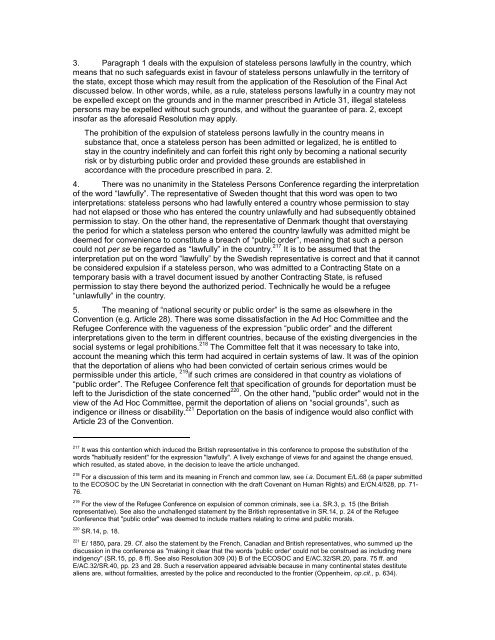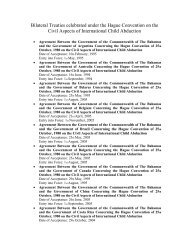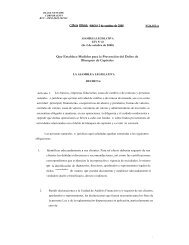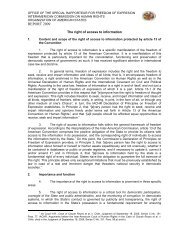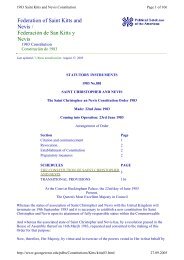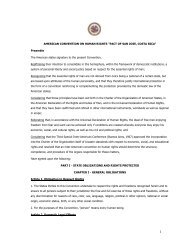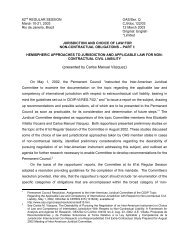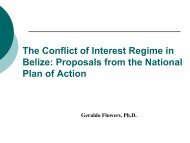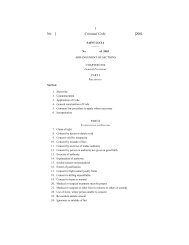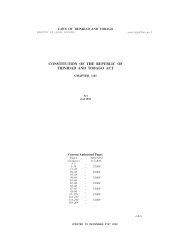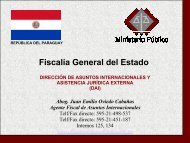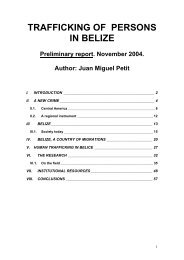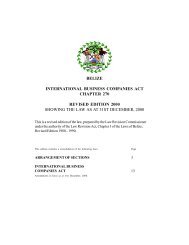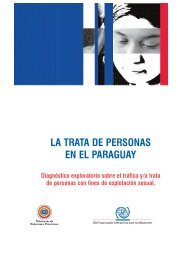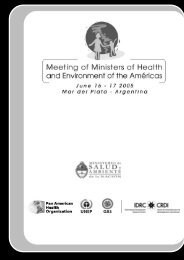CONVENTION RELATING TO THE STATUS OF ... - Refworld
CONVENTION RELATING TO THE STATUS OF ... - Refworld
CONVENTION RELATING TO THE STATUS OF ... - Refworld
Create successful ePaper yourself
Turn your PDF publications into a flip-book with our unique Google optimized e-Paper software.
3. Paragraph 1 deals with the expulsion of stateless persons lawfully in the country, which<br />
means that no such safeguards exist in favour of stateless persons unlawfully in the territory of<br />
the state, except those which may result from the application of the Resolution of the Final Act<br />
discussed below. In other words, while, as a rule, stateless persons lawfully in a country may not<br />
be expelled except on the grounds and in the manner prescribed in Article 31, illegal stateless<br />
persons may be expelled without such grounds, and without the guarantee of para. 2, except<br />
insofar as the aforesaid Resolution may apply.<br />
The prohibition of the expulsion of stateless persons lawfully in the country means in<br />
substance that, once a stateless person has been admitted or legalized, he is entitled to<br />
stay in the country indefinitely and can forfeit this right only by becoming a national security<br />
risk or by disturbing public order and provided these grounds are established in<br />
accordance with the procedure prescribed in para. 2.<br />
4. There was no unanimity in the Stateless Persons Conference regarding the interpretation<br />
of the word “lawfully”. The representative of Sweden thought that this word was open to two<br />
interpretations: stateless persons who had lawfully entered a country whose permission to stay<br />
had not elapsed or those who has entered the country unlawfully and had subsequently obtained<br />
permission to stay. On the other hand, the representative of Denmark thought that overstaying<br />
the period for which a stateless person who entered the country lawfully was admitted might be<br />
deemed for convenience to constitute a breach of “public order”, meaning that such a person<br />
could not per se be regarded as “lawfully” in the country. 217 It is to be assumed that the<br />
interpretation put on the word “lawfully” by the Swedish representative is correct and that it cannot<br />
be considered expulsion if a stateless person, who was admitted to a Contracting State on a<br />
temporary basis with a travel document issued by another Contracting State, is refused<br />
permission to stay there beyond the authorized period. Technically he would be a refugee<br />
“unlawfully” in the country.<br />
5. The meaning of “national security or public order” is the same as elsewhere in the<br />
Convention (e.g. Article 28). There was some dissatisfaction in the Ad Hoc Committee and the<br />
Refugee Conference with the vagueness of the expression “public order” and the different<br />
interpretations given to the term in different countries, because of the existing divergencies in the<br />
social systems or legal prohibitions. 218 The Committee felt that it was necessary to take into,<br />
account the meaning which this term had acquired in certain systems of law. It was of the opinion<br />
that the deportation of aliens who had been convicted of certain serious crimes would be<br />
permissible under this article, 219 if such crimes are considered in that country as violations of<br />
“public order”. The Refugee Conference felt that specification of grounds for deportation must be<br />
left to the Jurisdiction of the state concerned 220 . On the other hand, "public order" would not in the<br />
view of the Ad Hoc Committee, permit the deportation of aliens on “social grounds”, such as<br />
indigence or illness or disability. 221 Deportation on the basis of indigence would also conflict with<br />
Article 23 of the Convention.<br />
217 It was this contention which induced the British representative in this conference to propose the substitution of the<br />
words "habitually resident" for the expression "lawfully". A lively exchange of views for and against the change ensued,<br />
which resulted, as stated above, in the decision to leave the article unchanged.<br />
218 For a discussion of this term and its meaning in French and common law, see i.a. Document E/L.68 (a paper submitted<br />
to the ECOSOC by the UN Secretariat in connection with the draft Covenant on Human Rights) and E/CN.4/528, pp. 71-<br />
76.<br />
219 For the view of the Refugee Conference on expulsion of common criminals, see i.a. SR.3, p. 15 (the British<br />
representative). See also the unchallenged statement by the British representative in SR.14, p. 24 of the Refugee<br />
Conference that "public order" was deemed to include matters relating to crime and public morals.<br />
220 SR.14, p. 18.<br />
221 E/ 1850, para. 29. Cf. also the statement by the French, Canadian and British representatives, who summed up the<br />
discussion in the conference as "making it clear that the words 'public order' could not be construed as including mere<br />
indigency" (SR.15, pp. 8 ff). See also Resolution 309 (XI) B of the ECOSOC and E/AC.32/SR.20, para. 75 ff. and<br />
E/AC.32/SR.40, pp. 23 and 28. Such a reservation appeared advisable because in many continental states destitute<br />
aliens are, without formalities, arrested by the police and reconducted to the frontier (Oppenheim, op.cit., p. 634).


